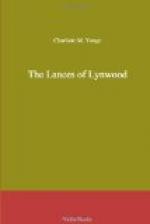At last he beheld the Cathedral of Burgos rising in the midst of the Moorish fortifications of the town, and, halting his men under the shade of a few trees, he rode on in search of the marshals of the camp, and as soon as the open space for his tents had been assigned, he returned to see them raised. Gaston, who had of late become more silent, was lifted from his mule, and assisted into the tent, where he was laid on his couch, and soon after, Eustace was relieved from his anxiety on Leonard Ashton’s account, by his appearance. He came stumbling in without one word of apology, only declaring himself as weary as a dog, and, throwing himself down on a deer-skin on his own side of the tent, was fast asleep in another minute.
CHAPTER VI
Leonard Ashton was awakened the next morning by the light of the rising sun streaming in where the curtain of the tent had been raised to admit the fresh dewy morning air. The sunbeams fell on the hair and face of Eustace as he leant over Gaston, who lay stretched on the couch, and faintly spoke: “I tell you it is more. Such fever as this would not be caused by this trifling cut. There is sickness abroad in the camp, and why should it not be my turn as well as another man’s. Take care of yourself, Sir Eustace.”
No sooner did Leonard understand the sense of these words, than he sprang up, rushed out of the tent, and never rested till he thought himself at a safe distance, when he shouted to Eustace to come to him.
“Has he got this fever on him?” exclaimed he, as Eustace approached.
“He is very ill at ease,” replied Eustace, “but to my mind it is caused by yesterday’s fatigue and heat, added to the wine which he would drink.”
“It is the fever, I say,” replied Ashton; “I am sure it is. Come away, Eustace, or we shall all be infected.”
“I cannot leave him,” said Eustace.
“What? You do not mean to peril yourself by going near him?” said Ashton.
“I think not that there is peril in so doing, answered Eustace; “and even if there were, I could not leave him in sickness, after all his kindness to me and patience with my inexperience.”
“He is no brother nor cousin to us,” said Leonard. “I see not why we should endanger our lives for a stranger. I will not, for my own part; and, as your old friend and comrade, I would entreat you not.”
These were kinder words than Eustace had heard from Ashton since the beginning of his jealousy, and he answered, as he thought they were meant, in a friendly tone, “Thanks, Leonard, but I cannot look on Gaston d’Aubricour as a stranger; and had I fewer causes for attachment to him, I could not leave my post.”
“Only you do not expect me to do the same,” said Leonard; “my father sent me here to gain honour and wealth, not to be poisoned with the breath of a man in a fever.”
“Assuredly not,” said Eustace. “I will arrange matters so that you shall no longer sleep in our tent. But let me ask of you, Leonard, what was the meaning of your conduct of yesterday?”




